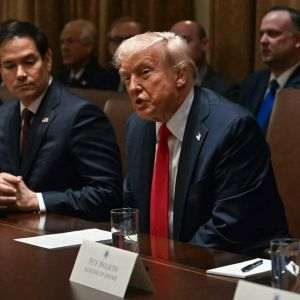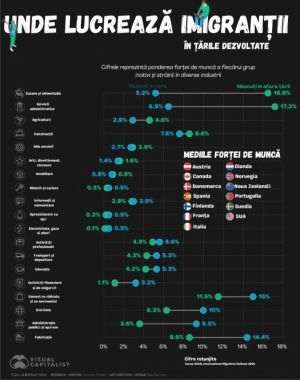The diagnosis does not need many validations and revalidations: Democracy, in its very home, in the Western space of of its creation and historical development, is suffering. It is in trouble. It is weak, where it should have excelled: the quality of the elites in power, and respectively the control of citizens over the exercising of powers. It is obviously incapable of producing and putting to work the solutions needed for the postmodernity not ending up in the dump for the failures of modernity. It is unacceptably fragile to the authoritarian or non- or actually anti-democratic pushes of their representatives (otherwise democratically elected!!), especially when they have on hand the convenient excuse of special, crisis circumstances. If a test was necessary, we are already dealing with it. One century later, "the Chinese flu" is going through the same scenario as the "Spanish flu".
One hundred years later, the solutions for controlling and fighting a major threat to the economic and social security are just inefficient, both medically and in terms of the reaction ability of the institutions, especially among the government. Us citizens have only been given two solutions: go into total isolation or deal with the problem head on and God have mercy...the lucky ones will survive...everybody else, tough luck! It seems too little to me, in full "post-industrial revolution"! If we were to take the "scientistical" "products" of those who have turned the "Science of physics" into a beauty pageant for hypotheses that have never been thoroughly and definitively tested, we know almost everything about the creation, structure, behavior and evolution of the Universe, but paradoxically, we know almost nothing about a primitive biological entity, a virus, respectively about its interactions with the human biology. And for the picture to be complete, we need to only add the fact that Europe has already 70 years since the Monnet-Schuman project for a different kind of politics, a project meant to generate unity, prosperity and democratic development of the European societies, sheltering them forever from the peril of the tragic experiences of the "big wars" happening again.
Almost seventy-five years later, we find that the European institutions have withdrawn like a snail in its shell when the wind of the pandemic crisis blew over Europe, that "nationalisms" are the solutions on the raster, safer, better, more efficient than the European policies and solutions, that the resources and difficult decisions still remain up with the national institutions when we are in danger, that the European citizens, for whom we have even devised a passport, are in fact orphans in Europe, when it comes to solutions and massive support their health and economic survival! To say it is too little would be a gross understatement! Therefore, what better opportunity to reflect on all of the above, to invoke citizens' direct action, than Europe Day.
That is what the organizers of the pan-European event "Citizens take over Europe" thought of as well. In other words, they are taking it back from the "politicians" and the "European institutions" not to run away with it who knows where, but also to mark the necessary break moment from what has existed so far, with Europe's weaknesses and failures, of its underdeveloped Democracy. But, in particular, to bring back to center stage the main character, the one placed in the background by the arrogance of the representatives of democracy and by their institutional solutions: citizens, people in the street, in the classroom, in the workshop, factory or lab, regardless of their social and professional position, the Man-Citizen without which any speech about Politics, Democracy and Europe remains pointless and barren. This entity, which is not just generic, but which exists inside each of us, is being called to say clearly: That's it, things can't go on like this anymore! Furthermore, in a collective effort, it is being called to invent and place on the table solutions for tomorrow's politics, for Democracy, for Europe.
That is the essence of the initiative launched on a pan-European level by several organizations of civil societies. It is one stop along a route. The goal is called "the change from the ground up", grassroots reinvention of democracy. What the ideas that the road began with were, what the confusions and unclear factors were, what the options available were, which were far from being consistent, you can find out via the materials made available as part of the initiative of the Bursa newspaper, a significant standard bearer, promoter and supporter of the debate about representative democracy, in general and, in Romania in particular, concerning the solutions to overcome the crisis that we are in.






























































1. fără titlu
(message sent by Salomeea Romanescu on 18.05.2020, 18:13)
The hypothesis: for all the progress in the construction of the new identity of European Union, the European Civil Society (resistance against the coercive European Political Society) cannot accept “the embedded neo-liberalism” (the EU’s actual hegemonic Project) without finding real solutions for so-called “social fracture” of globalisation and this represents a big threat to the soft security model of Europe. This research is based on the neo-Gramscian integrative theoretical perspective. The question is: could Civil Society fr om CEEC, as social power participate in the potential anti-hegemonic Project of European Civil Society (in neo-Gramscian terms), able to face the hegemonic project of European Political Society, “embedded neo-liberalism”? After examining CEEC case study the answer is negative because this Civil Society is not yet well organised, even it is ripe to understand their social situation and the possibilities to change it in alliance with other transnational forces of Social and Christian Democracy fr om Europe. This study of the CEEC’s EU integration was made fr om two perspectives: as a challenge, but also as an opportunity for the Western European and Eastern European winners and losers: European Round Table of Industrialists, European Civil Society, European Union and CEE Governments and Civil Society, by examining the connections between power in production including social power, power in the state, and power in international relations and proposing a new project by shifting fr om a paternalistic policy paradigm of “embedded neo-liberalism” towards a new and more enlightened policy paradigm towards integration, in the frame of a comprehensive humane security concept in Europe and humane governance, fr om a feminine perspective, by adapting the emergent geo-governance to the realization of human rights.
1.1. Global Humane governance (response to opinion no. 1)
(message sent by Salomeea Romanescu on 18.05.2020, 18:19)
A Challenging project of Global Humane governance for sustainable development opportunity
This chapter would like to introduce concepts as Humane security, sustainable development and humane governance able to curb the ignored threats, in a feminine perspective.
3.1.New humane security paradigm as a common denominator of all European actors against common challenges
This sub chapter deals with the concept of Humane security and his potential positive impact on the quality of life; first section put the security redefinition need in the international context, second tries to define humane security and third shows the importance of humane security in transforming the losers of European Integration in winners, as a potential modality for a positive scenarios of Integration, as win-win game.
“World politics should not be viewed as a historically frozen process of power-hungry states, but rather as a dynamic process of interaction among individuals, groups, states and international institutions, all of which are capable of adapting their sense of self-interest.”
After the Cold War the militarized conception of security was challenged by multifaceted and holistic conceptions like humane security, concept which lacks a clear definition and any agreed upon measures on it. We have to notice that the Military security failed to ensure the territorial security of a nation-state. The collapse of so called communism and of Soviet hegemony in Central and Eastern Europe, removed the immediate military threat. The replacement of the major military threats fr om the East by the multilevel and multidimensional threats has lent great instability to the European Security System, which was not prepared to deal with it, in term of competences, policies and institutions.
Because Europeans face so many security challenges and promising opportunities, all of which compete for higher attention and resources, it will be difficult to deal with non-traditional threats. However, some of them will not be ignored for long time. Individual security can no longer be satisfied only through military measures; it needs multidimensional understanding.
Humane Security is difficult to be achieved in actual existing international system mainly dominated by sovereign states. A current state - centered system has been inadequate to provide security and welfare as we have analysed in the first and second chapter. Nation states risk losing their external and internal sovereignty. In our logic of humane security nation states have to reorder priorities, problem is what criteria? These could be: The sovereignty of the Human Person, Participation in decision- making and Response to Unmet Human Needs.
The following issues needs the priority of governments and international organisations:
Hunger, housing, health care, education, employment, environment, war prevention, crime prevention, care of the aged, racial justice, women’s rights, religious freedom, penal reform, urban planning, population, democratic participation, prevention of alienation and addiction.
Most of the leaders would insist that they personally embrace the above agenda. Pragmatically, however, these issues are subordinated to national security priorities. In the present world system, national policies developed primarily around the above criteria would threaten the ability of their nations to survive.
The lights of Humane development will remain out for a majority of humankind until the emergence of a world-order system. It is important to emphasize that we are not advocating constant mobilization for national security. It is rather a question of recognizing the reality that present corporate priorities and elite rule are not primarily due to ideological or personal demons. The world does not need more demonology. What is needed is objectivity - not the rationalize fatalistic acceptance of the status quo, but to identify the all sources of powerlessness: of leaders as well as of citizens. The surest way to entrench the status quo is to focus too exclusively on the powerlessness of the people and to rely on demonology at the cost of a more holistic analysis.
The definition of security issues, the way in which they were analyzed and the policies that resulted were the fruits of the dominant geopolitical and ideological atmosphere during the Cold War period. Security concept has a strong political base and it changes according to it
Security continues to be calculated by the degree of “destructive capacity possessed in relation to an expected enemy. “The achievement of security in a global setting is largely reduced to the management of boundaries of the territorial state- the degree of capacity to keep unwanted persons, ideas, things out, and to keep what is wanted within.
To extent that security is globalised, it is associated with establishing the conditions that best enable the expansion of gross planetary product and stimulate the growth of world trade within a framework stabilized by policies that produce the triple indictment”
What is remarkable about this geopolitical image of security is its durability, one that traverses the distinction drawn earlier between modern, state-centric geopolitics and post-modern market-geared geopolitics. The absence of critical self-reflection is terrible. What needs to be acknowledged here, among other challenging perspectives, is the relevance of feminist voices fr om around the world in fashioning other possible responses to the actual. The revision of security is crucial to the all enterprises of global civil society and the shaping of the global polity in accordance with the criteria of humane governance.
Subrahmanyam clearly identifies this element of necessity in the following passage:
“Either humanity unites to survive, or it is bound to face a bleak future. The strategy of a non-violent and nuclear free world has no alternative, if future generations are to survive in condition of sustainable development. We of this generation have to stark choice before us. Either we become saviours of our posterity or its executioners. Either we opt for life or shatter the future of mankind.”
This sense of urgency is here affirmed. Also to be underscored in the idea that continued democratisation depends on the establishment of a security, which radically breaks with perceptions and practices that have given substance to geopolitics throughout modern history.
It is obvious that to initiate a discussion of security on this radical note is to highlight the distance separating such a position fr om the mainstream thought in the North and fr om the outlook of most governing elites in the South. And it is equally predictable that it will be dismissed thereby as “utopian”. To respond helpfully to the challenge ahead it is necessary to summon the intellectual and political courage to face the depth and extent of the problem that faces humanity.
What, exactly, is meant by the term humane security and why humane security is so important in a optimist scenarious of Integration. What is humane security? «There are two basic aspects to humane security - freedom fr om fear and freedom fr om want. Freedom fr om want is no less important than freedom fr om fear because his objectives are to ensure the survival and dignity of individuals as human beings. The epoch-making 1994 UNDP Development Report discussed the concept of human security in depth, and identified seven main categories of human security – economic security (or freedom fr om poverty); food security (freedom fr om hunger), health security (freedom fr om disease), environmental security (the availability of clean water and air, for example), personal security (freedom fr om fear of violence, crimes, drugs), community security (freedom to participate in family life and one's ethnic group), and political security (freedom to exercise one's basic human rights)».
Why is humane security important for the optimistic scenarious of Integration? What is the trend in Europe regarding the social fracture of Globalisation? Any balanced view, the Europe success was supported by social settlments that allowed equity and efficiency. Employment relations institutions and process associated with this model of development are under strain. They suffer of crises of economic functionality and out of line with new emerging patterns of economic and social life. Despite the social forces that identify themselfs with values of The European social model (see annex 8a) there is a tendency to defend inherited institutions rather than to construct new forms of social solidarity compatible with the complexity of modern economic life. In his book Paul Teague points out that “any innovations need to address three important themes: the democratization of the EU, the future association between the nation-state and economic citizenship; and the institutional reform of the labour-market governance".6( see annex 8b)
In a stark prediction European Governments will soon have to choose between a free market and free society with the top concern about social justice, by placing the organisation of society secondary to business activity may not be an efficient model of economic competition. The political game between neo-liberal Europe and Social Europe is still on. The key benchmarks, which could test if human security has been revived, would be: lower unemployment, better labour market access and more democratic and participatory work places. Some humane security concerns can no longer be kept hidden fr om critical scrutiny. The performance of governments and international organisations will be judged increasingly by the extent to which they seriously and effectively deal with humane security concerns. We hope that Europe could marry again, economic efficiency with social justice, in a feminin perspective different of masculin anglo-saxon perspective.
3.2.Sustainable development as a common denominator for all European Actors and new opportunity
First section of this subchapter will make an anthology of the actual trends of defining sustainable development in contrast with development concept used in standard economic theory, actual position of EU concerning sustainable development and the implications of it for the employment in Europe and finally participation as an important aspect of sustainable development. We have chosen to do it by using Internet resources and relevant literature. We will try to make a synthesis of all of them for economic reasons. (see annex 9)
In standard economic theory, Development implies both quantitative change (growth in Gross Domestic Product) and qualitative change (transformation fr om a pre-capitalist economy based on agriculture to a capitalist industrial economy) etc. Theory of sustainable development involves both a critic of quantitative GDP measure and a different view of qualitative transformation. The goals of sustainable development include a harmonization of economic, social and environmental goals:
Economic - an economically sustainable system must be able to produce goods and services on a continuing basis, to maintain manageable levels of government and external debt, and avoid extreme sector imbalances that damage agriculture or industrial production.
Environmental - an environmentally sustainable system must maintain a stable resource base, avoiding overexploitation of renewable resources systems or environmental sink functions and depleting non renewable resources only to the extent that investment is made in adequate substitutes: this include maintenance of biodiversity, atmospheric stability, and other ecosystem functions not ordinarily classed as economic resources.
Social - a socially sustainable system must achieve fairness in distribution and opportunity, adequate provision of social services, including health, including health and education, gender equality, and political accountability and participation. These three elements of sustainability introduce many potential complications to the original, simple definition of economic development.
This new concerns for development will create new opportunities for job creation in the area of Social and Environment. It could be a good opportunity for CEEC countries to get job in this new domains. Together with sharing job opportunity and highest wages strategy will contribute to bridging the gap between Western and Eastern disparities, following the logic of balance in a chine’s way.
EU has a strategy for sustainable development but specially for sustainable trade and what is relevant for our thesis is the fact that EU recognizes the necessity to work together for achieving this aim, on his declaration at the World Summit for sustainable development fr om Johannesburg, September 2002.8
“Economic growth along side environmental and social concern: Sustainable development demands a fundamental change in the way we live our lives. In a complete break with the past this calls for a major reorientation of public and private behavior and thinking. The challenge is to bond economic growth with social concerns and to decouple economic development fr om environmental degradation. It calls for creative, long-term policy making, efficient and responsible use of resources, cost-effective environmental policy and cleaner technology. Governments, business, and citizens need to work together to create the conditions in which sustainable development can happen.”
To bridge the gap between the popular agenda and elitist agenda of Global governance we need to find common values upon which a viable future can be built. We start by considering five aspects of sustainable development analized by UNDP: Empowerment, Cooperation, Equity, Sustainability, and Security.9Related to these aspects are nine principles, which could help political institutions to achieve sustainable development, as suggested by UNDP: Participation, Transparency, Responsivness, Consensus orientation, Equity, Effectivness and Efficiency, Accountability, Strategic vision.10We would prefere to choose to speak on Participation forced by the economy of our thesis.True democracy is ch aracterised by horizontal processes across a broad spectrum of relationships, in contrast with parliamentary democracies based on vertical hierarchies.
The euphoria developed over events in Eastern Europe after the fall of one party political system a decade ago has masked the irreparable inadequacies in the new capitalist democratic system. The fundamental proposition of democracy needs to focus on an ongoing process than the structure of representation. Egalitarian interaction have to be a new democratic principle in considering that development of Western democratic systems in the 19th century coincided with expansion of European Colonialism. Economic decentralisation is a more appropriate form of integrating nature and society. Sensitivity towards the human subject in economic planning shall overcome foundations laid down by modern economies. It would reduce the widespread global structural violence maintained by the political and economic elites of dominant Western powers.
Next subchapter will try to put light on the concept of global governance and his relevance for curbing the actual “social fracture” of Globalisation, big threat for International security. The conflicting logics of actual actors are dangereous and the problem is how to make them to coexist, what would be the appropiate mechanism and strategy to make them to work together with common agenda, taking into account their conflicting interests. It would not be enough for each state or people to have its own vision of a better future, in our case not only the Countries fr om CEEC space have to have a strategy for the accession into EU, or ERT a strategy for a free market, but the EU as a whole, as a new political entity able to deal with all these challenges. EU, as an international actor, has the economic and logistic power to do it, to transform its self on an entity dealing with sustainable development using humane governance mechanism, creating the framework of working together for all actors.
3.3.Global humane governance as a counter hegemonic project, fr om European Civil Society perspective
Global humane governance will be the subject of discussion on this subchapter. First section points out the necessity of creating such a system in order to avoid the blaming and also the prescriptive top-down approach of global governance after analyzing the world order present models. Third section discouses the conflict between long-term interest and short interest, common values of the actual actors involved on international politics. Sustainable development and Humane security transform the global geogovernance concept in Humane geogovernance and the fourth section will try to explain the prospect for Humane governance.
Our thesis will only present general ideas because the discussion needs more space. We give more space to the prospect for humane security, which eventually will be part of the new security identity of Europe, civilian approach (see the non-violent peace force network-making the bridge between USA and Europe).
In order to find a global humane governance system, we need first a constitution developed around the following functions: disarmament, involving the protection of human rights; social justice, environmental protection; economic and social development; and the regulation of international processes such as trade, transportation and communication. What the new world-order models have in common is a commitment to the basic human values as fundamental criteria of world order. They begin with common problems and then formulate functional institutions to cope with those problems. In today’s nation-state competition, those values that conflict with national security goals have little chance to become operative on any significant scale.
The starting point of each Model or governance is the necessity to have as a common denominator but the problem is which one? Sustainable development and Humane security for all actors of international system and the Right to development can be the key words, as integrative concepts of all human needs for the humanity as a whole. In public policy debates, few argue openly in terms of their own self-interest. Everything is couched in terms of general interest.
Fourth section deals with humane governance opposite concept of geo-governance. Humane geo-governance is the preferred variant of geo-governance. Humane geo-governance is not a structure to be blueprinted, but a process of engagement that is guided by a principle of non-violence. Humane governance is a preferred form of governance being a process and a goal, which emphasizes the achievement of comprehensive rights for all peoples on earth. We have to worn that our passivity will ensure the triumph of the G-7 view of the human future. The prospect for human governance is urgency. (see annex 10)
In sum, Humane governance emphasizes people-centered criteria of success, as measured by declines in poverty, violence and pollution and by increasing adherence to human rights and constitutional practices, especially in relation to vulnerable segments of society, as well as by axiological shifts away fr om materialist/consumerist and patriarchal conceptions of human fulfillment. The perspectives of humane governance stress the accountability of elites and the participation by the peoples of the world and their directly elected representatives. It is necessary to explore the meaning of humane governance in a series of conceptual and policy settings, as well as some implications of counter-projects to shape geo-governance in more beneficial ways than those resulting fr om global market forces.
The political imaginations of the rich and powerful are still caught up in greed and by efforts to retain short-run advantage. As a consequence, the historical opening at the end of the Cold War has been largely squandered, being treated as one more opportunity to consolidate power and wealth.
If Globalisation brought negative aspects, the positive aspect of Globalisation is that it has brought an active civil society, fighting for more democracy and greater social justice.
3.4.Conclusions and perspectives on the future project of the European Civil Society
We could conclude that a civilization the more it advances in sacrificing ideals and values to interests, the more perverse and degenerate is. A "civilization" that conveniently and unscrupulously subordinates values to interests is not really worthy of being called a civilization. No matter how it may develop its material aspects, it will remain empty at its human core, which is always moral-spiritual based. In this regard, world politics is shifting fr om a horizontal axis of Right vs. Left, to a vertical axis of economic materialist values vs. ecological, feminist, spiritual values; and the central “struggle” for the next generation.
A hegemonic project should be developed around issues of a humane security system via the OSCE and an economic strategy, which considers good environmental and social standards and full employment to be more important than efficiency, competition and high levels of economic growth. In this respect, it is important to challenge the neo-liberal wisdom, which has acquired a status of natural truth during the processes of globalisation. This will not be easy and requires a long war of position. Institutions should be set up, which could provide the platform for organic intellectuals and for the development and promotion of an alternative to neo-liberalism. Ministers and representatives stressed the crucial role of NGOs as key non-state actors partners in developing, advocating, building and implementing humane security. The question is if these social forces are prepared to face the actual hegemonic ongoing process of embedded neoliberalism. Let’s sum these potential forces of Europe and their input to this coalition already in formation, before answering to this question:
Pressure groups - Redistribution of benefits and losses resulting fr om lobby activities and these influential pressure groups both in the CEEC and the EU itself can affect the position of losers and winners.
Trade union- Intensified co-operation between trade unions within Europe, including the sector level: on co-ordination in respect of wages, working conditions and social regulation complemented by much closer co-ordination of national economic and social policies, going beyond neo-liberal solutions.
Nation-states - particularly decision-making elites could be ready to participate on this coalition with new ideas able to relegitimise their authority because even the most powerful nation-states - are no longer able to fulfill the purpose for which they were created (elected) consequently not longer legitimate.
The exploitation of the sphere of reproduction may result in either a nationalist, reactionary response led by extreme-right parties such as the Austrian Freedom Party, or a progressive internationalist response as indicated in the programmes of Green parties and a broad array of social movements. Recent demonstrations during the Carnival Against Capitalism (London, June 1999) as well as mobilisation against the World Trade Organisation (Seattle. November 1999) and the World Bank and International Monetary Fund (Washington, April 2000; Prague, September 2000) are examples of progressive internationalist response. An important step in building a more viable human future is to identify all the sources and causes of our present powerlessness. For this purpose we have to examine the report between: Legal justice / Social justice: Legal justice is conformity to laws passed by a legislative body. Such justice may no have relationship to social justice which is conformity to natural laws that do not depend upon human legislation, i.e. inalienable rights to food, dignity and self-determination. In fact, in many cases, legal justice is in direct conflict with social justice. A major task in our days is to develop a process and system in which the criterion of legal justice is social justice. This is a big challenge and opportunity at the same time for lawyers, social scientists and practitioners to help this project of civil society, as noble mission.
What is common to all actors is that the criterion of human development is shelved “for the duration”. The duration here is not the short -term reality. Rather, this duration is here to stay until a global security system with functional institutions capable of dealing with rampant global forces is developed. Some of our friends have counseled us that to speak of the logic of national security mobilization and of corporate elite rules is to furnish “the haves” with the rationale needed to preserve their power just at a time when they are under attack fr om every side. What is needed, they argue, is even greater pressure fr om the people. Such advice does not dig deeply enough in its search for a solution. As long as the obsolete world system continues unchanged, the logic of national security mobilization will remain operative as a major obstacle to goals of fuller humane development.
FINAL CONCLUSIONS
The theoretical approach of explanation of European Integration is out dated because neo-functionalism and intregovernmentalism can’t take into account the wider structure of Integration, namely the global structural change and the post-Cold War context. Globalisation is ch aracterised by two interlinked processes, the transnationalisation of finance and production at the material level and, a shift fr om Keynesian to neo-liberalism as a driving force of Globalisation and European integration, fr om a political economy perspective. The post War international economic order in the Western world was a compromise between the principle of economic liberalism and national interventionism, called “embedded neoliberalism”. Consequently, of equal concern is what globalization does to democracy. Globalisation, as it has been advocated, often seems to replace the old dictatorship of national elites with new dictatorship of international finance and this is big threat for the state and personal sovereignty. To overcome the theoretical impotence, we need a theoretical model able to explain integration and to democratize the actual geo-governance for the realization of human rights. The humane governance prospect is urgency and our thesis has tried to propose an embryo of it.
The focus on class struggle was the heuristic model for understanding structural change and how CEEC have been affected by global structural change after the Cold War. The structure of the thesis reflects the struggle between transnational actors ERT- power in production, in coalition with EU - as a soft superpower, power in state as a balancer between this two emergent coalitions of hard power, on one side and the coalition of soft power, represented by social power, so called civil society, on the other side. The principal question was if the civil society is ready to form a counter-hegemonic bloc at the European level in alliance with CEE governments, able to face the actual hegemonic bloc driven by embedded neo-liberalism. The answer is negative fr om two reasons: the actual European Civil society is manipulated by the EU by institutionalization of the civic dialog via the ESC, for the preservation of the status-quo and the other reason is the lack of financier independence, logistic and internal problem of democratization of these civic society entities fr om both sides Western and Eastern Europe. The creation of counter hegemonic bloc would be possible at the International level and we can’t make any prediction yet. The actual tendency at the European level is for polarization not for polarity and this represents a big threat for the soft security model of Europe. Therefore a marriage between Social Europe and neo-liberalism has to be a priority for the new identity of Europe, to curb the eventual polarization of social forces of all Europe. Europe could be a model of global humane governance for humane security and sustainable development, and the recent White paper on Governance and Strategy for sustainable development shows clear signals of this political will. Europe has humanistic values, material capabilities and institutions to make a difference in the World, as a feminine soft answer to the paradox of Democracy (spreading democracy in very undemocratic way) and Security dilemma. The question is how to make all this actors work together taking into account their divergent interest. The solution is to find the values, which are commons for all actors, as sustainable human development including humane markets and humane security and cooperative behavior and culture. Our continent has tradition in Christian message and this represents an important value, which will transform integration into a real win - win scenarios as peaceful conflict resolution soft model. A shift fr om horizontal logic of Left and Right to a vertical common logic of ecology, feminism and sustainable, equitable and democratic development is already in process at the theoretical discourse. Development is not about helping a few people get rich or creating a handful of pointless protected industries that only benefit the country’s elite, for the urban rich and leaving the rural poor in their misery. Humane development is about transforming societies, improving the lives of the poor, enabling everyone to have a chance to success and access to health care and education. This sort of development won’t happen if only a few people dictate the policies a country must follow. Making sure that democratic decisions are made means ensuring that a broad range of economists, officials, and experts fr om CEEC are actively involved in the debate in a new model of global humane governance. It also means that there must be broad participation that goes well beyond the experts and politicians, so the democratization of the actual geo-governance and ESC institutionalized such a civil dialog and this represents a great opportunity. But still the people in Western countries escape their responsibilities stating that transition countries must take ch arge. We need some time for the reactualization of our humanistic European tradition in new ideology.
In conclusion global mobility capital and production in a world of open economies have made the central policies of European social democracy unworkable12. By so doing they have made today’s mass unemployment a problem without a simple solution. The monetarist theories that presently dominate the world’s central banks and transnational financial institutions deny that any trade-off of price stability with full employment can be achieved.
We assumed that a shift on the theoretical discourse could produce a change in real life. This was the motivation of our thesis at the deeper structure. Let’s sum the perspectives on the opportunities and challenges of the European Enlargement.
fr om the EU perspective the enlargement towards CEEC is evaluated as a challenge for his strategy of Enlargement, for ERT as an opportunity for a free market strategy, fr om CEEC perspective as an opportunity for filling the vacuum of security and their impotence to assure sustainable development in the actual context, fr om the Civil Society perspective, European integration can be evaluated as an opportunity for a new counter-hegemonic project, for global governance for humane security and human development oriented, and organic intellectuals have the noble mission of the construction of the anti-hegemonic Project, in a neo-Gramscian terms. All this actors are winners fr om their perspective.
In sum the big challenges for ERT are the job creation for overcoming the European crises of unemployment and the disparities between East and West, demonstrating on their perspective that integration is win-win scenarious and thus public opinion has to support this process.
The real challenge would be the adaptation of the ongoing geo-governance to the realization of human rights as we stated before. This is a big challenge and opportunity at the same time.
For millions of people fr om CEEC and Western Europe globalisation has not worked and they are losers. Many have actually been made worse off, as they have seen their jobs destroyed and their lives become more insecure. They have felt increasingly powerless against forces beyond their control. If we fail to learn fr om our mistakes, globalisation will not only succeed in promoting development but will continue to create poverty and instability. This will be a tragedy for all of us. Unemployment could persist for years, and government intervention would be required. The free market ideology should be replaced with analyses based on economic science, with a more balanced view of the role of government drawn fr om an understanding of both market and government failures.
These challenges are present at the surface structure but what are the remaining challenges, at the deeper structure? And what new strategies and policies should be formulated to effectively address these challenges? A big issue for actual history is who will be the responsible for the failure of the states? Who will be the guardian of the general interest when the private interest will go too far? Who will be accountable for the Human rights violation when the states are force to give up their sovereignty? These are questions without a proper answer. This thesis cannot provide an answer; it can only invite you on further reflections and research on this field.
We can start by assuming that ”as long as the nation–state system continues to dominate global interaction, the state will continue to be the key provider, or alternatively, the major abuser of human rights towards its citizens.”13 This paradigm seems to be out-dated because at the deepest structure, the biggest violators of human rights are the Transnationals and some International Intergovernmental organisations as well.
Global Humane Governance is the magic word for the management of the common affaires of the World and European Union is the only International actor having the real material and spiritual potential to do it, because UN doesn’t have the material capabilities for it.
1.2. fr om European Civil Society (response to opinion no. 1.1)
(message sent by Salomeea Romanescu on 18.05.2020, 18:30)
1.3. fr om European Civil Society perspective as a potential opportunity
This subchapter will introduce the neo-Gramscian concept of Civil Society and his role for the potential anti-hegemonic project in contrast with actual concept of European Union Civil Society within the Economic and Social Committee and Civicus1 and his present role. This will cover the first section of this subchapter. In the second section of the same subchapter we will try to answer to the principal question of our thesis: Could European Civil Society starts the anti-hegemonic project of the actual European Political Society hegemonic project of Embedded neo-liberalism?
The high development of civil society and close links to the political state apparatus in Western European countries makes Gramsci’s analysis about the impossibility of a war of movement even more valid in present context.” A counter-hegemonic historical bloc must be prepared and established within civil society before any assault on the state can be successful. Importantly, this has to occur fr om the bottom up, since if it happens fr om the top down the hegemonic forces influence the development of the current version of civil society towards making it an agency for stabilising the social and political status quo.” The position for such a bottom-up strategy is mystified. We agree with Murphy regarding the existence of “an international civil society, which he identifies as public and private institutions such as governmental and non-governmental international organizations” .This would indicate that a counter-hegemonic war of position at the international level could be feasible. Germain and Kenny, however, points out that “Gramsci's concept of civil society was closely linked to the state and, since there is no international state, there can be no international civil society.” It is therefore correct to agree also in this case with Cox: ”the task of changing world order begins with the long laborious effort to build new historical blocs within national boundaries”. EU can be perceived as emerging structure of geo-governance, a macro-region within the capitalist world economy with its specific, historically determined socio-economic and political structures, whe resupranational institutions such as the European Parliament and the Commission adopt similar roles to their counterparts within states, and complex policy-making processes link a host of interest groups to decision-making. As a product, the EU is increasingly considered to be a political system in its own right. A counter-hegemonic movement could, therefore, also be developed at the EU level fr om within European civil society. Between this neo-Gramscian theory and the actual reality of the European Civic Society it is a big difference, especially on the role and the direction: bottom-up or top-down initiative.
Gramscian concept of Civil Society is contrasting with the European Economic and Social Committee’s perspective, which defines the concept of "civil society organisations" as being "the sum of all organisational structures whose members have objectives and responsibilities that are of general interest and who also act as mediators between the public authorities and citizens". This concept includes” all economic, social and occupational organisations, these being a fundamental component of organised civil society and governance within and beyond the borders of the EU. In many cases, they also play an increasingly important role in providing access to a number of collective goods or services (education, social protection, health etc.) as intermediaries between the public authorities (the State and its administration) and the marketplace.
A discussion is necessary in order to identify the civil society typology for a better understanding.
The self-organizing movements, initiatives, associations and publics, putting the social in motion were different than the either the latent networks of societal autonomy or institutionalized civil society as we know them in the West. In our thesis we distinguish civil society as movement and as institution, the former as a kind of constituent civil society creating the latter, the constituted, institutionalized version. Some forms of institutionalization evidently permit the reappearance of movements and initiatives that in turn may or may not aim at yet another institutional break. This later difference is made by our distinction between revolution and civil disobedience. Civil disobedience, linked to social movements or initiatives represents the outer limits of collective action within civil society, and is significantly different than civil society organized as movement.
We will present what is the situation at the European institutionalized level in a systematical way.
“The First convention of civil society organised at European level which took place at the initiative and under the auspices of the Committee, on 15 and 16 October 1999, confirmed the important role civil society organisations have to play in setting up a form of democratic public discourse in which citizens are fully involved, and hence in the development of a participatory model of civil society and in the formulation and implementation of policies which, by strengthening extra-parliamentary democratic structures, can increase confidence in the democratic process. This Convention of October 1999, which also clarified the role that the European Economic and Social Committee can play as an institutional channel in the decision-making process, aimed at bringing Europe closer to its citizens, the ESC has had two priority aims:
to establish the groundwork for cooperation with all organisations representing civil society at European level, and
to accentuate the Committee's role of providing a bridge between civil society organisations in the European Union and the applicant states on the one hand and the EU institutions on the other”
Between the role of the Gramsci’s concept of civil society and the actual role of civil society it is a big gap. The actual European civil society is manipulated to preserve the status quo in comparison with the role of Gramsci’s civil society, which is an agent of change for a more feminine society, it is a revolutionary movement not an institution.
In contrast, the actual European Civil Society is institutionalized, it is a permanent forum for dialog: „The Nice Treaty, approved by the Intergovernmental Conference on 10 December 2000, confirmed the ESC's function in this respect, by making it the institutional representative, at European level, of civil society organisations. Indeed, Article 257 states that ‚the Committee shall consist of representatives of the various economic and social components of organised civil society, (…)’. This treaty thus gives the Committee an additional opportunity to play its full role as a relay between Europe and civil society organisations and act as a permanent, structured forum for dialogue and consultation at Community level.”
The role of Economic and Social Committe is very important for the dialog with civil society:“The ESC has an essential role to play in promoting greater support for and participation by civil society organisations in the European venture. In so doing it helps to develop a society that is more participatory, more inclusive and therefore more democratic, and to facilitate the emergence of such a society in countries or groups of non-EU countries and in particular in the applicant countries.”
Civil society actors today often face the difficulty to define their role and their relationship towards other structures and actors of society and towards each other. At the request of CIVICUS in Europe in his recent exercise civil society expert Andrew Crook explores the roots and nature of civil society in a European setting. The piece has been first made available at the recent CIVICUS in Europe meeting in Zagreb.
The paper is intended to form the basis of a discussion on the nature of European civil society initiated by CIVICUS in Europe.
It is hoped that discussions like this will generate firm theoretical basis of nonprofit activity thus resulting in the better recognition of nonprofit work.
For our purpose of defining the European Civil Society, few quotations fr om this paper are relevant:
“… most informal discussion of civil society typically assumes both that there is ‘something’ which can be called civil society in virtually all parts (nations) of the world and that the features of civil society vary considerably fr om place to place. … the sphere of civil society is present in all European nations but that the ch aracteristics of civil society vary fr om place to place.”
“The distinguishing feature of civil society is that (unlike those directly involved with politics or the economy i.e. businessmen or politicians) its actors do not seek directly to control either the economy or the state but rather to influence them.”
In recent months new opportunities have risen for civil society in Europe to tighten co-operation with the European Union and its institutions. The Future of Europe debate was started in 2001; the White Paper on European Governance was released (July 2001); and currently – in line with the decisions of the Laeken Summit – a platform of discussion is being set up in the form of a Forum open for NGOs (abreast the Convention with MPs, government officials fr om member and applicant states discussing the future of the EU).
The last two major documents published by the European Commission are dated fr om 1997 16and 2000, thus the above developments seem to mean a new opening of the EU’s intention to co-operate with civil society organisations, and with its citizens.
The further expansion of EU-NGO relations creates the chance for NGOs to be taken even more seriously than before, improve their ability to lobby for their causes and goals they represent, and also to the benefit of the EU. Gaining on the momentum civil society should take these new opportunities seriously and be part of them actively. In this process of co-operation initiatives also come fr om NGOs. e.g. the European Citizen Action Service, a Brussels-based member of CIVICUS, has been instrumental in commenting the White Paper and argued for a compact or framework agreement between the EU Institutions and NGOs.
The second section of this subchapter looks at the readiness of the western present European Civil Society for initiating a counter hegemonic project. In this context of actual European civil society, the chances of overcoming neo-liberalism at European level are slim, although this should not be read as an support of the slogan of ”there is no alternative” (TINA), but rather than new patterns, supportive of a move away fr om the discipline of capital. A new synthesis has been established across different state-civil societies in Europe around the concept of a “Third Way”. We would question whether this reflects a rival orientation to the neo-liberal organisation of social relations or merely constitutes a modernisation of capitalist social relations of production and the reconstitution of social cohesion rather than transformation, as we have seen fr om our analyses in the second subchapter. Therefore, despite trade union mobilization against austerity in the mid-1990s (e.g., in France), and the victory of social democratic parties in Britain, France and Germany, the hegemonic project of ”embedded neo-liberalism” has been hardly challenged. To cite Perry Anderson 19”one might say that, by definition, TINA only acquires full force once an alternative regime demonstrates that there truly are no alternative policies”. A recent exception was the temporal opposition represented by Oskar Lafontaine and like-minded people in 1998 and early 199920. To be successful, counter-hegemonic forces must go beyond bordering social policies. Mitigating the accepted policies of neo-liberalism will not prove a solution. We have also to face a dilemma that would be one obstacle for the success of the transnational NGOs, networks, and movements “how to continue to practically pursue their policy agendas at the same time that they work to enhance their own internal democratic practices and the representation and accountability of the transnational network sector. NGOs and networks are informal, asymmetrical, and ad-hoc antidotes to domestic and international representational imperfection.”
Concluding we can say that the European Civil Society is not yet ready to face embedded neo-liberalism fr om two reasons: external one, which consist in the actual manipulation of civil society by the political society to preserve the status-quo and by institutionalization of civil society and internal one, originated in the lack of an adequate entity for civil society, which could clarify the problems of internal democracy, representation and accountability.
1.4.Conclusio ns and perspectives
To sum unemployment it is a common challenge for all three perspectives but the perception of it is different. ERT should not see unemployment as just a statistic, an economic body-count, the unintended casualties in the fight against inflation or to ensure that Western banks will get repaid. For the EU the policy for unemployment is not yet a priority on the Enlargement towards CEEC. The all concern of EU on this issue of Enlargement is the conditionality dictated by the ERT strong lobbies. While conditionality did engender resentment, it did not succeed in engendering development and overcome unemployment. One sided negotiations in which all the power is in the hands of the EC, because the CEEC seeking the EU’s help are in desperate needs of funds after the collapse of communism. So the relationship between Production Power, State Power and International Relations Power is one of dependency, of asymmetry, in particular ERT imposing to the EU and EU imposing to the candidate of member states. The intergovernmental explanation of the European Integration is not appropriate because the setting of Agenda of Negotiation is more important than the negotiation process its self. The production powers- TNC-s- are more powerful that state and intergovernmental organisations.
Who will be in ch arge with such a project, of defending the losers? Gramsci and neo-Gramscian researcher had the inspiration to indicate this so- called actor “civil society”. After the examination of the actual form of European Civil society we have to make one remark: the actual concept of civil society remains inundated by ambiguities. Even after differentiating it fr om political and economic society, moves that remain controversial, it remains unclear what the dimension of civil society primarily entails. The question is what is the point of referring to the whole complex set of concepts as civil society? Of course we can ask in return the same question about the economy and the state as well. But in these cases the concepts of money and political power do indicate the outlines of differentiation. Can political and economic society; their parliaments and governing boards exclude free communication? Can the associations of civil society exclude money and power? There are evidently many associations of civil society whe remoney and power represents the actual rational, and there are political parties too that behave as social movements.
So the relation between social power and International Relation power is also one of dependency and asymmetry. Civil Society concept doesn’t have a specific difference and a special entity and for this reason the concept is confused and this could be a subject for further research.
The Social Power, so called soft power is manipulated for the preservation of status quo and is not well organised because of lack of financial independence and imagination on dealing with internal democracy, representation and accountability. The concept of civil society needs clarification concerning his role, as agents of transformation and of building blocs. We need to know more about its structure and the relationship to expert publics, as well the publics of the political and economic society.
1.3. counter-hegemonic project (response to opinion no. 1.2)
(message sent by Salomeea Romanescu on 18.05.2020, 18:35)
The Maastricht compromise reflects the gradual rise of what can be called an ”embedded neo-liberalism”. This is neo-liberal view as it emphasizes the primacy of global market forces and the freedom of the movement of the transnational capital. So, as a result of such processes, markets become increasingly disconnected fr om their post-war national social institutions and we risk a shift fr om a “national dictatorship” to an “international dictatorship” in these so called transition countries. In one side, one may read “embedded neo-liberalism” as the outcome of the transnational struggle between the three projects of neo-liberalism, neo-mercantilism and supranational social democracy. This was a struggle in which the neo-liberal became dominant but still had to accommodate the concern both of the former neo-mercantilist and of the social democrats. The neo-liberal project incorporated these rival concerns in such a manner that they were subordinated to the interests of globalising capital (neglecting the social democratic concerns in this compromise). In the other side, “embedded neo-liberalism” can also be interpreted as the emerging hegemonic project of Europe's transnational capitalist class. This class has become dominated by- the leadership of a globalist fraction both in terms of financial firms and global industrial TNCs.
This process of assimilation is an extremely attractive and powerful project, which became the basis for expansion towards Central and Eastern Europe. Our thesis would like to argue that European Integration is not a win-win scenarious yet, as it is considered on the theory of integration2; even the removal of barriers to free trade and closer integration of national economies, they have the potentiality to enrich every one, especially the poor. What is the reason for this failure? The neglect of the social protection and the denying of the existence of genuine unemployment by the standard model that economists had used for generations could be one explanation; the only reason that unemployment existed was the wages were too high, suggesting the simple remedy: lower wages. They argued that markets worked perfectly and outworn presumption that markets, by themselves lead to efficient outcomes and this failed to allow the desirable intervention of the government in the market for the guidance of economic growth and make everyone better off. Therefore, the second section of the first chapter deals with the existing social cohesion policy and unemployment policy at the EU level, which is not yet prepared to answer to the social challenges. Some hope for the future exists, taking into account the recent proposal of social working group, to include on the draft of the constitution, as objectives on the Art. 3: promotion of full employment and quality of work, together with social justice and sustainable development.
In sum, “embedded neo-liberalism” is here interpreted as a potentially hegemonic project unifying Europe's “transnational capitalist class” and expressing its collective interests and identities. The discourse and strategy of the ERT continued to play an important role in the evolving regime of European socio-economic governance into the 1990s. The question is who will articulate and defend the public interest against the global reach of private financial and commercial interests, when the latter will go too far? The third subchapter of the both first chapter and second chapter will introduce the Gramsci’s concept of Civil Society in contrast with the actual concept of civil society at the European level. Gramsci’s concept of civil society has the potentiality to advocate the losers of integration, “organic intellectuals” having the noble mission of imagining a counter-hegemonic project - basis for a new building bloc.